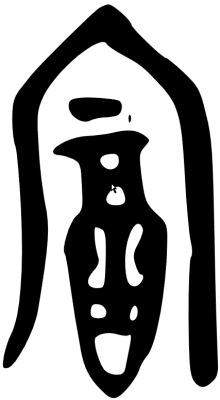Three lines
Here’s another phrase that appears three times in the Yijing: 富以其鄰, fu yi qi lin, ‘rich in one’s neighbours’. In 9.5, you are rich in your neighbours –
‘There is truth and confidence as a bond.
Rich in your neighbours.’
while in 11.4 and 15.5, you aren’t –
‘Fluttering, fluttering.
Not rich in your neighbours.
Not on guard against truth and confidence.’‘Not rich in your neighbours:
Fruitful to use this to invade and conquer.
Nothing that does not bear fruit.’
Not all translations make this obvious. Wilhelm, in particular, gives the phrase completely different meanings in different lines: ‘rich in your neighbour’ in 9.5, but ‘not boasting of his wealth, together with his neighbour’ in 11.4 and ‘no boasting of wealth before one’s neighbour’ in 15.5.
I have – of course – huge respect for Wilhelm, but I simply can’t see where this comes from. In 11.4 and 15.5 you have the exact same four words as in 9.5 – ‘rich in one’s neighbours’ – preceded by ‘not’, 不 bu. It’s very simple: rich, or not rich. Richard Rutt notes this and says of 9.5, ‘Possibly the positive form of the same oracle found here is a mistake and the negative particle has been lost.’ Possibly… but let’s assume it means what it says.
What it says
‘Neighbours’, 鄰 lin, means what’s neighbouring, adjacent, and also a ‘neighbourhood’ of four or five families. The significant component of the character means ‘city’. It’s used in a couple of other places in the Yi: 51.6,
‘Shock twists and turns,
Watching in fear and terror,
Setting out to bring order: pitfall.
The shock does not reach your self,
It reaches your neighbour –
No mistake.
There are words of marital alliance.’
and 63.5,
‘The neighbour in the East slaughters oxen.
Not like the Western neighbour’s summer offering,
Truly accepting their blessing.’
The Western and Eastern neighbours are the Zhou and Shang: neighbouring states, first allied through marriage, then at war. So we might remember Zhou and Shang whenever the text mentions neighbours – though I think it’s enough just to think of neighbouring states, which could mean allies or enemies. Making them into allies was a pressing concern of King Wen: as he readied his people to take on the Shang, he made an alliance with one neighbouring state and conquered five others, creating a secure base from which to launch their campaign.
‘Rich’, 富 fu, means wealth, abundance and becoming wealthy. The old character shows a long-necked jug under a roof:

It’s used at 37.4:
‘Enriching the home.
Great good fortune.’
Rich in your neighbours?
It seems natural, in 37.4, for a home to have fu – wealth pictured as a jug under a roof. That’s where you would expect your wealth to be, surely: securely under your own roof. But if you are rich in your neighbours, the wealth is in your surroundings, where you live – distributed through the fabric you’re part of. It’s not exactly yours, but it is close at hand. (No remote treasure-hunting quests required.)
Or – in two of the three lines – it isn’t close at hand, in which case you’ll need to do something different.
Line by line
9.5
‘There is truth and confidence as a bond.
Rich in your neighbours.’
Truth and confidence, fu – that wonderful quality of sincerity, trust and presence – acts as a bond. The ‘bond’ is a close, tight one, meaning passionate attachment, being inseparable, tangled together.
Part of the word for ‘bond’ means ‘chaos’, and experience suggest this is not a formal agreement: the truth and confidence makes that unnecessary. This is help that comes naturally, with no scorecard: a mutually supportive community, unquestioned friendship, help from family.
I’ve also experienced it recently as wealth fully distributed through the whole fabric of my life: oracle, friends, family, ‘cello, essential oils, trees, a local market… – a reminder that security doesn’t necessarily involve owning or controlling.
This is good to know when you’re under the dark clouds of Hexagram 9 – ‘dense clouds without rain’ – with their concomitant frustration and gloom. Hexagram 26 – Great Taming – in the background encourages you to let your world expand: not eating at home, crossing the great river. You can’t make it rain, but look a little further afield and see how rich you are now.
11.4
‘Fluttering, fluttering.
Not rich in your neighbours.
Not on guard against truth and confidence.’
‘Fluttering’ is pian 翩: graceful, light, swift, flying, fluttering. There are feathers in the character – and given the line’s position, just on the edge of the upper trigram, looking out over an ’empty space’ of yin lines, with the energy of inner qian flowing through it, I’ve always imagined it as a fledgling testing its wings. Line 4 is so often asking, ‘What can I do out here?’
Fu, truth and confidence, trust and presence, has got a great deal harder since 9.5. There is no support to be had nearby – you are not provided for, not looked after – but this should not translate into defensiveness. On the contrary, you need to go further.
I think this line’s developing the same theme we saw in 11.3:
‘There is no level ground without a slope,
No going out without a return.
Constancy in hardship is not a mistake.
Do not sorrow about its truth (fu).
In eating and drinking there is blessing.’
Yes, things are hard; no, this is not a calamity to be mourned; you need to participate in your world (line 3). Or – no, your neighbours will not look after you, but this is no reason to shrink into yourself and become demoralised (line 4). If anything, you should be encouraged by adversity.
That’s been my experience with readings, anyway: if these people or circumstances are not helping you, you need to trust to your inner strength, or the support of thin air, and flutter past this negative experience in search of a new neighbourhood. If these people aren’t buying, reach more people; if this workplace is nightmarish, look for another job; if this landlady is malicious, start searching for another home.
The zhi gua for this line – the hexagram it changes to – is 34, Great Vigour, and the fan yao – the mirroring line, changing back from 34 to 11 – speaks of breaking through a hedge. There’s a whole world out there beyond these neighbours.
15.5
‘Not rich in your neighbours:
Fruitful to use this to invade and conquer.
Nothing that does not bear fruit.’
On the face of it, this is an odd message to find at the apex (5th line) of the hexagram of modesty and not taking too much on oneself. Invade and conquer? Why?
Bradford Hatcher has been the greatest help to me in understanding this one. He wrote,
‘It was interstate propriety, if not unwritten law, to offer emergency relief to neighboring states in times of crisis. This refers to a neighboring state refusing to do so, probably looking for political advantage in the neighbor’s misfortune.’
There’s at least the beginning of an explanation: the neighbour should have helped you in your difficulty. Perhaps this invasion is something like the action of the noble one in the Image –
‘In the centre of the earth there is a mountain. Integrity.
A noble one reduces what is too much and increases what is diminished,
Weighing things up to even out their distribution.’
Could this be a kind of Robin Hood raid?
This is Integrity encountering Hexagram 39, Limping, difficulties, struggle. ‘Not rich in your neighbours’ is the opening statement of the line: here is the challenge to deal with. How does Integrity respond? Not by glossing over the problem – no ‘I’m fine, really, you don’t have to worry about me.’ This looks like a ‘put your own oxygen mask on first’ message: don’t take too much on yourself, certainly, but do take what you need.
In my encounters with this line so far, I’ve yet to see it call for true aggression. The ‘invading and conquering’ required has always been quite undramatic: be assertive, maybe ask forgiveness rather than permission. If people owe you money, get paid. If your experience has been bad, how will you change it?
The omen that concludes the line is important, too: ‘Nothing that does not bear fruit’ carries overtones of, ‘Really – nothing – not even this.‘ In other words, the text anticipates our bewilderment. Quoting Bradford Hatcher again, in the I Ching Community:
“The phrase “Wu Bu Li”, nothing not worthwhile, nothing not advantageous, nothing not favorable, nothing (can)not be turned to advantage, occurs a lot in the Yi. Essentially it says that there is rarely a situation which cannot be turned around or improved. Of course it takes an opportunistic approach to things – it’s enlightened self-interest which does this best. Sometimes one must presume that one knows what’s best. And sometimes it’s just like aikido, finding the center of things and turning the momentum around. When the Yi uses this phrase it seldom implies that things are going to turn around all on their own. One needs to own the moment.”
Read together
What’s to be learned from reading these three lines together?
Well… I think they can all be located in the Zhou Conquest story, and we can see it developing from one line to the next.
Hexagram 9 is a time of preparation, not yet ready for action, when King Wen is out working the fields with his people, and needs above all to make alliances. At this stage, your neighbours are your wealth already, with nothing to separate you.
Then as the story progresses and you can no longer rely on neighbours, you need to depend on truth, or your sense of truth. Small goes, great comes, says Hexagram 11. This hexagram marks a turning point in the story, where you might begin to look forward to greatness to come. If you have the Mandate of Heaven, then bad circumstances are not meant to discourage you, and above all, don’t mean you have lost your connection to spiritual support – on the contrary. ‘Fluttering’ might suggest an inbetween state – losing the support of your surroundings, on the verge of trusting yourself to something more insubstantial – or at least, not on guard against it.
And finally, the moment for invasion and conquest comes in 15.5. A lack of wealth in your neighbours is now the defining quality of the time, the precise moment that it is ‘fruitful to use’ for invasion. Not only should unsupportive surroundings not make you demoralised or paranoid, they should be your sign that now is the time to act to change them.










11.4: I got this oracle for the request of a friend of mine who was investigating the outcome of his courtship of a girl. The maiden of a well-to-do family “cames fluttering, without making her wealth weigh” (Wilhelm) towards him, corresponding with hesitation and oscillation -to update Wilhem-, together with the other female figures of the family (the other yin lines of Khunn ). With the phrase: “They have all lost the real” that Wilhem relates to this set of yin lines, I predicted to my friend that the relationship would fail, bearing in mind that Wilhem points out in the commentary that Khunn’s low line ( fourth on the hexagram) ” has renounced the (real) advantage that would come if the line joined the initial line (yang) = my suitor friend. In this first yang line the symbol leads back to the reed which is the Chinese image for procreate. The my friend subsequently married another girl who is announced on the fifth line of hexagram 11: “Sovereign I marries his daughter” (Wilhelm) and his marriage was fortunate “reaching the fulfillment of all his desires” (Wilhem).
Always find these so helpful. Never felt I understood 11.4 really but now its more clear